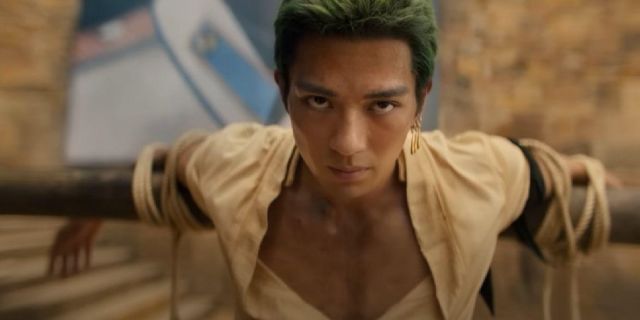The live-action One Piece Netflix series promises to bring the original One Piece manga and anime franchise to life in spectacular fashion, a faithful adaptation of Eiichiro Oda’s original work down to the finest detail. Interestingly, the series might actually subvert a few basic shonen ideas at first, as the recent trailer featuring Roronoa Zoro the swordsman showed.
Shouting attack names is a silly but beloved shonen trope, such as in Dragon Ball Z and certainly One Piece, but the live-action version of Zoro doesn’t subscribe to that idea, even if Luffy does. This isn’t just a meta-humor joke from the live-action series, though– this seemingly trivial detail might hint at a robust character arc for Roronoa Zoro in the upcoming Netflix series.
In the trailer for One Piece, Roronoa Zoro Deconstructs Shonen Tropes
In the live-action trailer for One Piece, we witness the protagonist Monkey D. Luffy demonstrating his Gum-Gum fruit powers by stretching his arm and delivering a decisive blow to the minor villain and pirate captain, Lady Alvida. As Luffy exclaims “Gum-Gum pistol!” during the act, a signature move from the early episodes/chapters of One Piece, it becomes evident that the live-action adaptation aims to retain the essence of shonen by incorporating the tradition of calling out attack names for added dramatic effect. However, Luffy’s new comrade, Roronoa Zoro, holds a different perspective on this matter.
Towards the end of the trailer, Luffy elucidates his flamboyant style to Zoro by stating, “All great fighters call out their finishing moves.” Zoro, skeptical of this notion, responds with a pause, asserting, “No, they don’t.” Although this exchange may appear to be a lighthearted conclusion to the trailer, it holds a deeper meaning within the context of the live-action series, shedding light on the characters’ personalities. By deconstructing this cherished shonen trope, Roronoa Zoro indirectly addresses a fundamental challenge faced by live-action adaptations of anime.
In order to translate anime into live-action movies and shows like One Piece, certain adjustments are necessary. The exaggerated and fantastical elements inherent in anime, such as over-the-top physics and comedic antics, must be toned down to accommodate real-life actors who cannot replicate the movements of animated characters or possess their abilities. Additionally, the manner of speech commonly found in anime, where characters shout attack names, would come across as absurd when performed by real individuals. Thus, Luffy only sporadically employs this trope, while Roronoa Zoro outright rejects it. This suggests that the characters in the live-action series may refrain from calling out their finishing moves, as Luffy suggested, although even a skeptic like Zoro might eventually succumb to its allure, albeit to a lesser extent.
Roronoa Zoro’s Skpeticism Gives Him Room To Grow
Roronoa Zoro’s concise critique of shonen flamboyance extends beyond a mere observation about the limitations of live-action anime adaptations. Within the One Piece universe, Zoro’s cold and dismissive remark offers a glimpse into his potential for personal development, particularly considering his bitter and self-centered demeanor during the anime’s East Blue saga. Once again, Roronoa Zoro is poised to undergo a transformative journey from a resentful loner to a genuine shonen hero who embraces the power of friendship and hope, largely inspired by the example set by Luffy himself. Zoro’s growth will manifest not only through his decision to join the Straw Hat crew but also by assimilating some of Luffy’s characteristics, including the practice of calling out finishing moves.
Most likely, in the live-action One Piece series, Roronoa Zoro will call out an attack name, such as Onigiri, to show some personal growth and mirror Luffy’s ways. No doubt Luffy will be thrilled to see that, though Netflix’s One Piece probably won’t make a habit of that – nor should it. The series will only need one “shouting attack name” scene for Zoro to showcase his personal growth, such as during a climactic battle where everything’s on the line, and the series may drop it after that, once the point is made. Such a strategy should be an excellent compromise between Zoro’s personal growth and the series’ limitations with flashy shonen tropes like shouting attack names.















Leave a Reply